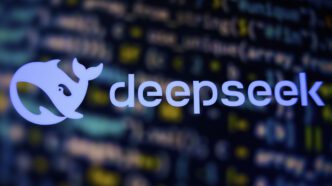The Trump administration is reportedly weighing new restrictions on the Chinese artificial intelligence firm DeepSeek, which could prevent the company from purchasing advanced AI chips made by U.S. tech giant Nvidia. The potential measures may also include barring Americans from using DeepSeek’s AI services, according to a report by The New York Times published Wednesday.
This move is part of a broader strategy by the U.S. government to maintain a technological edge over China in the field of artificial intelligence. Following DeepSeek’s rapid rise — which caught the attention of both Silicon Valley insiders and Wall Street investors — officials in Washington are looking at various options to curb the company’s growth and influence, particularly in relation to its use of American-made technology and its growing U.S.-based user base.
Just a day before news of these potential restrictions surfaced, the White House announced an expansion of existing rules to further limit Nvidia’s ability to sell high-end AI chips to China. These new measures build on regulations originally introduced by the Biden administration, aimed at tightening export controls on hardware critical for training powerful AI models.
DeepSeek’s models have gained significant traction among U.S. developers in recent months, thanks to their strong performance and highly competitive pricing. The company’s ability to offer access to frontier AI capabilities at reduced costs has put pressure on American firms, forcing some to lower their own pricing models to remain competitive. This price-driven disruption has contributed to concerns within U.S. tech and policy circles about the long-term implications of DeepSeek’s growing presence.
However, DeepSeek’s rise has not been without controversy. There are unresolved concerns about whether the Chinese company may have violated intellectual property laws to develop its AI models. OpenAI has publicly accused DeepSeek of distilling its proprietary models, a process in which a smaller AI system is trained on outputs from a larger, more advanced model. Such a practice, if done without authorization, would violate OpenAI’s terms of service and could be seen as a form of IP theft.
While no formal legal action has yet been announced, the allegations have added fuel to the broader conversation around national security, technological sovereignty, and the ethical implications of AI development. As U.S. officials continue to assess the potential risks of allowing unfettered access to AI tools developed by foreign entities, DeepSeek may soon face steep regulatory hurdles in accessing both American hardware and customers.
The outcome of these deliberations could have major implications for the global AI landscape, particularly as tensions between the U.S. and China continue to mount in the race for dominance in next-generation technologies.













